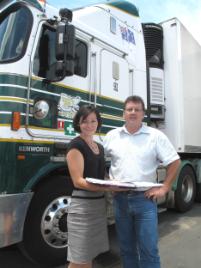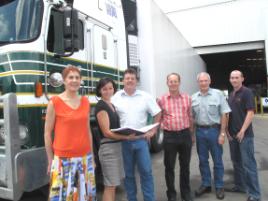Greenhouse emissions from Rocky's Own Transport 'better by a country mile'
Published on 04 November, 2010
CQUniversity researchers have recently completed a study for Rocky's Own Transport Company, seeking the best way to calculate, report and reduce greenhouse gas emissions from the trucking industry...
ROTC operates a fleet of 117 trucks from its headquarters in Central Queensland, and is recognised as one of our leading local businesses for being proactive about improving efficiency and environmental sustainability. A key part of this begins with understanding and reducing the company's greenhouse gas emissions.

Rocky's Own CEO Bryan Smith discusses the report with CQUniversity's Dr Susan Kinnear
Researchers from the University's Centre for Environmental Management reviewed the Rocky's Own fleet and analysed fuel consumption patterns, including the different types of fuels and supply sources. This information was used to build a new reporting worksheet under the National Greenhouse and Energy Reporting Scheme (NGERS).
The new template more accurately reported the emissions from Rocky's Own and resulted in a saving of around 3% on reported emissions, compared with the default NGERS option.
The researchers also provided a summary of the current research work being conducted on emissions from trucking with respect to emissions measurement, and the key factors influencing emissions, such as types and properties of fuels, vehicle and engine characteristics, maintenance and age, the trip type and driver behaviour.
The report noted that Australia has a unique operating environment for the national trucking industry, characterised by long-haul journeys and highway driving. This contrasts with the European situation, which is often short trips in heavy urban traffic - which are very heavy on fuel consumption.
Almost all existing work on emissions from trucking is based on the European system, yet this information is being applied in Australia. The research shows a clear need for Australian environments to be reflected when calculating emissions factors (and eventually a price on carbon).
The report also provided recommendations, such as considering the role of new engine technologies and diesel-fuel alternatives in reducing emissions, as well as the potential for ROTC to be the first Australian fleet on which emissions could be measured in real-time, through the use of the newly available PEMS - Portable Emissions Measurement Devices.
Rocky's Own Chief Financial Officer John Bryant said savings identified in the University report could be worth up to $50,000 per annum at the company level.
"This reinforces our belief we can lobby government and the industry for a more detailed study," Mr Bryant said.
"If we are going to collect data for a carbon trading scheme that's going to impact on our bottom line - when profit margins are already tight - at least let's plan to get the data right so we can plan for the long-term impact."
CQUniversity's Dr Susan Kinnear, who authored the report with Professor John Rolfe and Adam Rose, said Rocky's Own was taking a leading role, by taking the report's recommendations on board.
"We are not aware of any other Australian transport companies that have done this sort of detailed assessment," she said.


